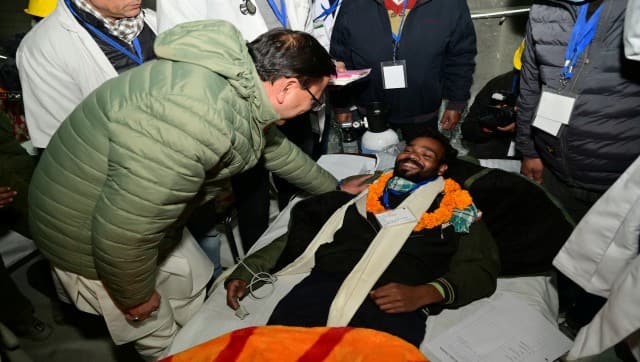On Tuesday, the 41 workers trapped in the Uttarakhand tunnel were freed after 17 long days. Now, the doctors and nurses tending to them will have to look after their physical and mental well being. The men were given food, water, light, oxygen and medicine through a narrow pipe but efforts to dig a tunnel to rescue them with high-powered drilling machines were frustrated by endless snags and equipment breakdowns until Tuesday. But what challenges could the workers face? Let’s take a closer look: Physical challenges As per The Times of India, the workers had already faced a host of physical issues while being trapped. This included constipation, headaches and increasing anxiety and trauma due to fear and claustrophobia. The newspaper quoted a senior Dehradun government doctor as saying the workers were likely to face respiratory problems. This, the doctor said, is because of the massive amounts of silica they have been exposed to in the tunnel. “They will possibly have serious respiratory issues after being stranded in the tunnel for a week. Additionally, some individuals may experience hypoxia, struggle to maintain normal oxygen levels, pulse rates, and blood pressure,” the doctor told the newspaper. Uttarkashi CMO RCS Panwar told the newspaper that the workers were given Vitamin C tablets and other medicine for constipation and headaches. [caption id=“attachment_13443852” align=“alignnone” width=“640”] Pushkar Singh Dhami, Chief Minister of the northern state of Uttarakhand, speaks with a worker after he was rescued from the collapsed tunnel site in Uttarkashi, Uttarakhand, India. Reuters[/caption] The men were in constant touch with rescuers through wireless devices and had two kilometres of space within the tunnel to walk around in, wash and rest. They were also sent anti-depressants through the small pipe. While they waited day after day to be rescued, the men were encouraged to talk to each other, tell stories, do yoga, light exercise and play board games sent in to them. Indian Express quoted Dr Suranjit Chatterjee, senior consultant of internal medicine at Delhi’s Indraprastha Apollo Hospital as saying nutrition would be top issue.
Pushkar Singh Dhami, Chief Minister of the northern state of Uttarakhand, speaks with a worker after he was rescued from the collapsed tunnel site in Uttarkashi, Uttarakhand, India. Reuters[/caption] The men were in constant touch with rescuers through wireless devices and had two kilometres of space within the tunnel to walk around in, wash and rest. They were also sent anti-depressants through the small pipe. While they waited day after day to be rescued, the men were encouraged to talk to each other, tell stories, do yoga, light exercise and play board games sent in to them. Indian Express quoted Dr Suranjit Chatterjee, senior consultant of internal medicine at Delhi’s Indraprastha Apollo Hospital as saying nutrition would be top issue.
Chatterjee said though the workers were provided rations, they would need to be examined for nutritional deficiencies.
Dr Atul Gogia, senior consultant of internal medicine at Sir Ganga Ram Hospital, New Delhi agreed. “There is the physical aspect — exhaustion and fatigue from being stuck within the tunnel, dehydration and nutritional deficiencies. Remaining in close quarters, in an enclosed place also increases the risk of infections,” Gogia said. Mental challenges But experts say that the workers need to be examined for mental trauma like Post-Traumatic Stress Disorder (PTSD). The Mayo Clinic describes PTSD as a mental health condition triggered by a terrifying event — either witnessing it or being part of it. According to the American Psychiatry Association website, PTSD was previously known as ‘shell shock’ and combat fatigue. It can manifest in all people, of any ethnicity, nationality or culture, and at any age. PTSD may manifest in the following ways:
- Flashbacks
- Nightmares
- Severe anxiety
- Uncontrollable thoughts
Dr Shaunik Ajinkya, wrote in Indian Express that those suffering from PTSD becoming hyper vigilant. “This state of heightened alertness is a result of the dangerous experience the people have had. They may also have flashbacks and intrusive thoughts related to the confinement experience, causing distressing memories to resurface unexpectedly and repeatedly,” Ajinkya wrote. He also said the workers could also engage in avoidance behaviour – that is staying away from anything that could lead to recalling moments associated with the incident. He said the workers could also suffer from social withdrawal – facing trouble relating to others who may not fully understand the depth of their experiences. “Some individuals may experience emotional numbness which can be evidenced as a detachment from emotions and a diminished ability to experience pleasurable occurrences,” Ajinkya wrote. Dr Dinakaran D, from National Institute of Mental Health and Neurosciences, said the workers face just such a risk. “All 41 would experience some post traumatic symptoms like insomnia, recurrent bad dreams, recurrent reliving of the tunnel collapse, anxiety,” Dinakaran added. “Not everyone will have the disorder but most will suffer from these symptoms for say three to six months.”
“There may be enduring changes in one’s personality,” Dinakaran said.
He added that the workers will need to be examined regularly for at least a year. Indian Psychiatric Society vice-president told The Times of India that the workers require “identification and counselling.” “Every mind responds differently in such a situation. There is a possibility of the workers facing mental health issues — bouts of anxiety and depression, after being trapped inside the tunnel for such a long period. Some may be required to be kept under observation for a while after rescue.” With inputs from agencies
)